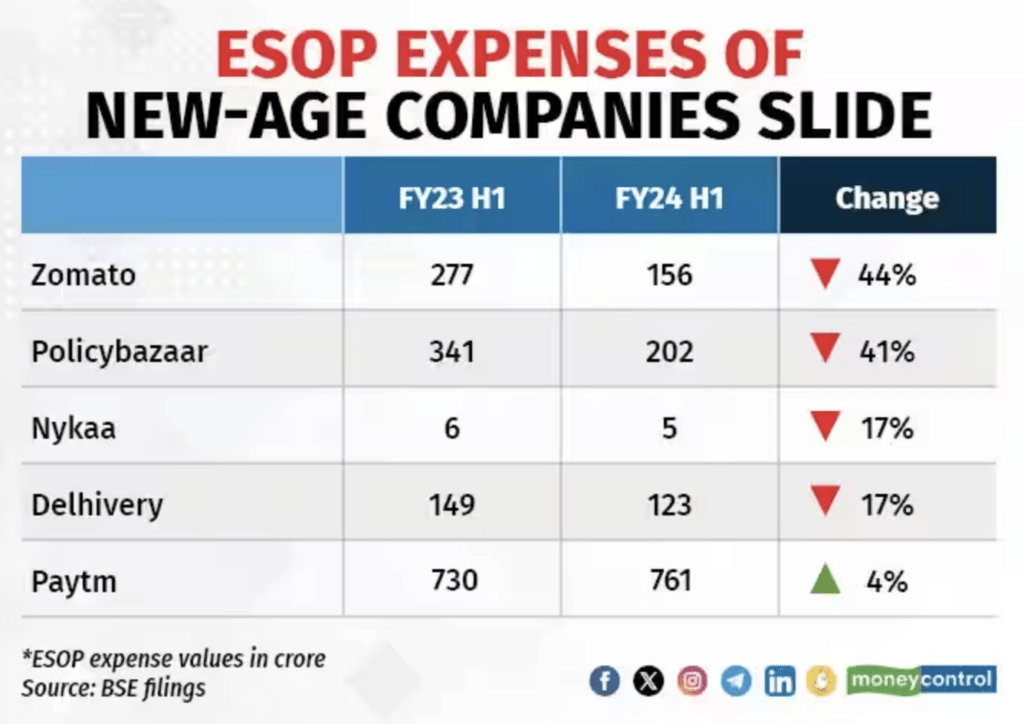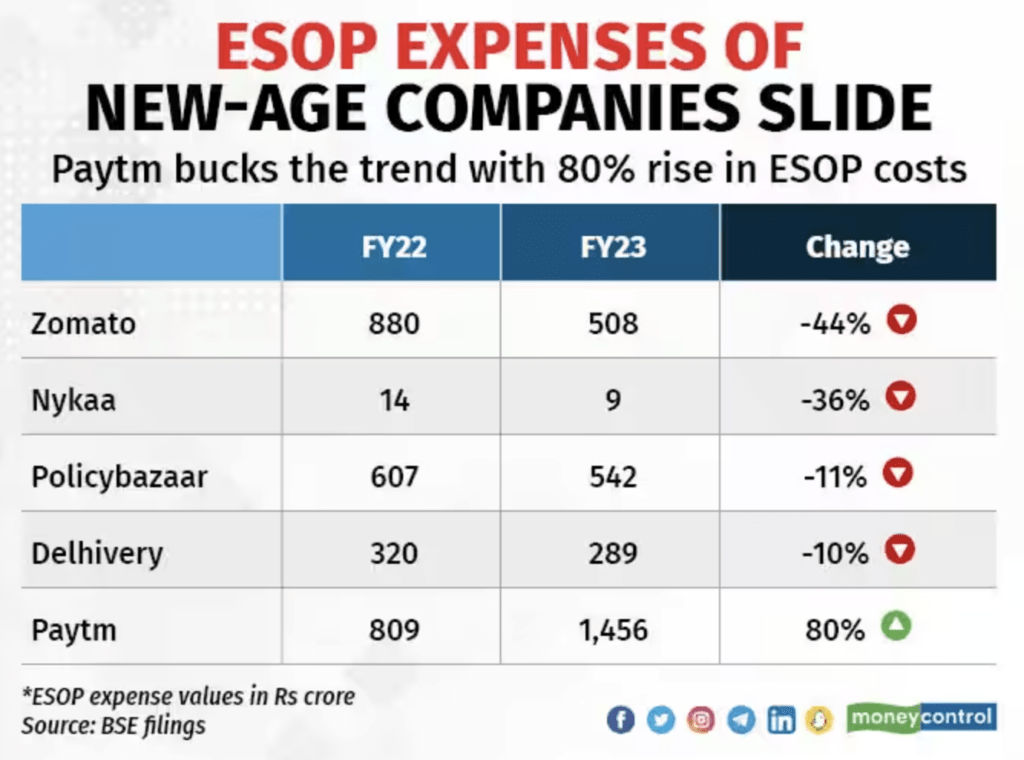Employee stock option (ESOP) programs are among the best ways to entice new talent or retain existing employees, particularly those driving startups toward billion-dollar success. Over the past decade, the popularity of granting ESOPs to employees has soared within the Indian startup ecosystem. However, the ESOP expenses of listed new-age companies came down significantly in the first half of FY24, according to data filed by these companies on the exchanges. This decline is primarily attributed to the significant shift in strategy, with most loss-making Indian tech startups now actively working towards achieving profitability.
In this strategic shift, Zomato led the charge with a striking 44% YoY reduction in share-based payment expenses in H1 FY24. Right on its heels, Policybazaar strategically trimmed its expenses by an impressive 41% YoY. Nykaa and Delhivery follow suit, lowering costs by a savvy 17%. However, breaking away from the expected norm, Paytm reported a 4% YoY increase in ESOP expenditures during the same period.
Let’s dig deep into the extent of Employee Stock Ownership Plans (ESOPs) offered to founders and employees by Indian startup unicorns.
ESOPs by Indian Startups
New-age companies such as Paytm, Zomato, Delhivery, and others have found themselves under scrutiny in recent years for the substantial Employee Stock Option (ESOP) grants provided to top executives shortly before their initial public offerings (IPOs). This strategic move, while aimed at retaining and motivating key talent, has become a point of criticism as it has cast a shadow on the profitability outlook for these firms in the last couple of years.
ESOPs are typically structured to vest over an extended period, often spanning 4-5 years. The consequence of these sizable grants to top leadership is expected to reverberate through the financials of these companies in the coming years.
As the granted options vest over time, the associated expenses will continue to impact the financial performance of these firms, creating a nuanced challenge in managing the delicate balance between talent retention, financial efficiency, and shareholder expectations.
Zomato’s ESOP expenses significantly declined, from Rs 277 crore in the first half of FY23 to just Rs 156 crore in the first half of FY24. However, amidst this decrease, the company’s overall spending on employee benefits experienced a marginal increase of 3%, reaching Rs 755 crore in H1 FY24. This intriguing dynamic highlights a nuanced financial picture, shedding light on the complexity of managing various facets of employee compensation.

Earlier reports on Moneycontrol revealed that Zomato’s co-founder and CEO, Deepinder Goyal, was granted Rs 143 crore of ESOPs in the second half of FY23. This financial commitment occurred amid Zomato’s efforts to persuade public market investors of its imminent journey toward profitability, underscoring the strategic importance of equity-based incentives in talent retention.
While Zomato successfully reduced its ESOP expenses by 42% from Rs 880 crore in FY22 to Rs 508 crore in FY23, the management acknowledged in an earnings call earlier this year that this downward trend might see a reversal in the future. The financial narrative of Zomato reflects a strategic balancing act, where the pursuit of profitability is intertwined with the complexities of compensating key leadership through ESOPs.
In sharp contrast, Paytm holds the title of the largest spender on Employee Stock Option Plans (ESOPs). The impact of these share-based expenses on its profitability becomes evident when considering that, in the first half of FY24, Paytm’s ESOP costs reached Rs 761 crore, while the net loss for the same period amounted to Rs 650 crore. Comparatively, the company’s ESOP expenses in the preceding year were Rs 730 crore, and the net loss was Rs 1,217 crore.
It is also important to note that Paytm’s expenditure on ESOPs rose 80% YoY from Rs 809 crore in FY22 to Rs 1,456 crore in FY23.

This heightened ESOP expenditure occurs against the backdrop of the company’s share prices enduring the consequences of losses. By the close of FY23, Paytm’s share prices stood at Rs 637 apiece, marking a 70% decline from its initial public offering price of Rs 2,150. Although the stock has since recovered to Rs 900 apiece, it still down 54% compared to its issue price.
In a bid to achieve positive free cash flow in the near future, the fintech unicorn Paytm has set its sights on disciplined resource allocation and a strategic focus on its core revenue drivers, particularly the payments and financial services business.
The financial landscape for Paytm is a tale of resilience and adaptation as the company grapples with the challenges of share-based expenses, market fluctuations, and investor sentiments. How Paytm manages and navigates through these complexities will likely shape its future trajectory and influence perceptions within the ever-dynamic financial market.
Sanjeev Bikhchandani, founder of Info Edge, a key backer of Zomato and Policybazaar, emphasizes the importance of ESOPs in retaining founder interest. He suggests that while dilution resulting from competitive fundraising might garner a sympathetic view, a reasonable allocation of ESOPs, perhaps in the range of 1-3 per cent of the company, can be justified. This approach acknowledges the unique challenges faced by founders and seeks a balance between incentivizing leadership and managing dilution concerns.
The dynamics of ESOPs in the context of founder interest and company growth underscore the complexity between financial strategy and talent retention in the ever-evolving landscape of new-age Indian tech companies.

